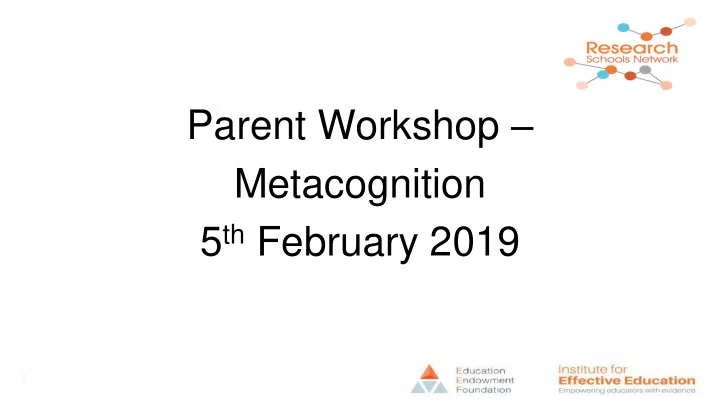

METACOGNITION AND GROWT Parent Workshop – H MINDSET Metacognition 5 th February 2019
What is Metacognition? Metacognition describes the processes involved when students plan, monitor, evaluate and then make changes to their own learning behaviours .
Why do we teach metacognition at Rosendale?
The research says…. Meta-cognition and self-regulation approaches have consistently high levels of impact, with pupils making an average of seven months’ additional progress . The evidence indicates that teaching these strategies can be particularly effective for low achieving and older pupils. sandringham.researchschool.org.uk @SandResearch
EEF Guidance Report
OFSTED -Outstanding • Pupils love the challenge of learning and are resilient to failure. They are curious interested learners who seek out new information to develop, consolidate and deepen their knowledge, understanding and skills. • Pupils are able to articulate their knowledge and understanding clearly and in an age appropriate way. They can hold thoughtful conversations about them with each other and adults.
Lets take a deeper look at what metacognition is…
How is this embedded into lessons? • Modelling • Challenge • Metacognitive Talk (Kagan) • Encouraging Independence • Reflecting
The Broader Definition of Metacognition In order to develop the children’s language around learning and encourage metacognitive talk we also teach explicit lessons around metacognition. These include: Growth Mindset Neuroplasticity Mistakes
Neuroplasticity -Are we born clever? Do you think that people are born ‘smart’ or become it? or Do you think that intelligence is something basic about you that can’t be changed or that you can always substantially change how intelligent you are?
The Brain Is Malleable Too often students believe the brain is static, leading them to think talent and giftedness are permanent, unchanging personal attributes that automatically bring later success. However this isn’t true, every time they work hard, stretch themselves and learn something new their brain forms new connections and over time they actually become smarter.
Growth Mindset Growth mindset is the belief that with effort, perseverance and resilience all students can attain at higher levels. Learners who have a growth mindset believe they can grow their intelligence with hard work.
Myths about mindsets Myth: Children with high ability are more likely to display a growth mindset. Truth: You might think that students who were highly skilled would be the ones to relish a challenge and persevere in the face of setbacks. Instead, many of these students are the most worried about failure, and the most likely to question their ability and to wilt when they hit obstacles (Leggett, 1985)
Marvellous Mistakes It is essential that children see mistakes as part of the learning process. Students need to understand that if they are being challenged they will struggle and consequently make mistakes. Mistakes are where most of our learning happens they give us a chance to reflect on and improve our learning.
How do we teach metacognition at Rosendale?
ReflectED ReflectED is a whole school approach to teaching metacognition that we developed and are currently implementing in our school. We are also conducting a national research project with the Education Endowment Foundation until summer 2019.
ReflectED This approach involves weekly metacognition lesson for every year group that teach children how to break down the learning process, including topics such as growth mindset, learning from mistakes and target setting. Alongside this, children will learn how to better plan , monitor and reflect on their curriculum lessons. These reflections will include looking at what helped them learn, any mistakes they made, and what they can do to improve.
How Does ReflectED Improve Children’s Learning? • Gives children a common language with Red - I don’t understand anything which to discuss their learning about this (yet) • Enables children to link together Yellow - I understand a little bit but learning and review their progress need some help • Helps children identify what strategies helped them learn therefore enabling Green - I understand the learning them to choose these again to assist in and can do this independently new learning Blue - I am confident enough at • Supports the development of a growth this to coach someone else mindset culture in the classroom
Corners This is an activity we use with children, especially those in KS1, which allows children to understand the colours and begin to realistically assess their own learning.
I can drive
I can ride a unicycle
I can play a musical instrument
I can speak another language
I can juggle
Learning New Skill
Reflected Booklets • In addition to Growth Mindset and New Skills Reflected teaches children about: • Motivation • What a successful learner looks like • Barriers to learning • Problem solving • Coaching, Feedback and Praise • Comprehension techniques • Memory
How can you help at home?
Strategies to try at home • Think carefully about the way you praise your children – effort vs ability. • Encourage your children to ‘have a go’ and use the ‘power of yet’ when they don’t succeed. • Help them to understand how to improve. • Help them to believe that they can improve. • Refrain from using terms such as ‘I wasn’t good at maths, so it doesn’t matter.’ • Model ‘growth mindset’ yourself . • Model metacognitive talk
Questions If you have any unanswered questions please write them down on a post it along side your email and we will get back to you as soon as possible with an answer.
Recommend
More recommend